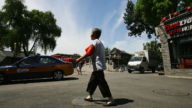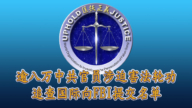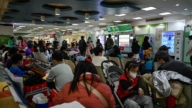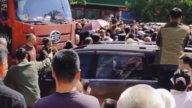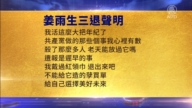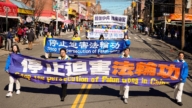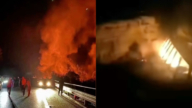【新唐人2011年8月13日讯】近期,以“茉莉花革命”为由,被中共拘禁的大陆维权人士和异议人士陆续被释放。8月9号,被关押近半年、备受国内外关注的异议作家冉云飞,也终于回了家。而流亡海外20多年的异议诗人北岛,也被中共高规格邀请,8月8号参加了由当局举办的诗歌节。分析指出,中共想利用知识份子,转变舆论对当局的批评,因此示好异议人士。
被中共邀请回国的著名异议诗人北岛,出席了由中共当局举办的“第三届青海湖国际诗歌节开幕式”,并发表演讲。
中共喉舌《人民网》在报导开幕式时,不但登出了北岛的名字,更刊出了他演说的照片,同时,也登出了他与中国作协主席及青海省几位官员的合影照。
《新华社》还发表了对北岛的长篇专访,长达1590字。
时事评论员伍凡认为,中共是想利用知识份子来改变人们对他的看法,妄想延续即将灭亡的命运。
伍凡:“就是打一张牌,你看我们对异议人士也宽松了,也是一种示好的手段,或者一种收买的手段,是想改变人们对中共的看法,但是我看不起作用的。”
北岛因支持6.4民运而流亡海外,他的名诗“卑鄙是卑鄙者的通行证,高尚是高尚者的墓志铭”中国民众耳熟能详。20多年来,北岛多次想回到自己的祖国,但一直被当局冷冻处理,这次受邀回国,令一些流亡人士感到意外,流亡台湾的诗人贝岭怀疑,当局有意分化海外流亡人士。
而独立作家冉云飞的案件则峰回路转,检察院对他的起诉被法院退回,现在他已回到家中,不过还被监视居住。冉云飞以前的辩护律师冉彤表示,这是案件缓和的表现。
冉彤:“监视居住是侦察过程中,一种权利限制的一种变更,比较缓和了一些。不能擅自对外联系,见人,有什么大的活动,要向当地的公安机关报告。”
冉云飞经常在网上发表时政文章,今年2月20号被四川警方以“散布茉莉花革命信息”为名带走,今年3月,中共当局以“涉嫌煽动颠覆国家政权罪”正式逮捕冉云飞。
今年二、三月间,中共当局拘押的多名异议人士和维权人士,已经先后获得释放。包括北京维权律师江天勇、滕彪、唐吉田,上海律师李天天,以及上星期获得释放的广州律师唐荆陵。但是,他们的人身和言论自由依然受到限制。
网路记者周曙光认为,释放拘押的异议人士改为“监视居住”是当局的一种策略。他有几位朋友也都是处于被监视居住的状态,当局提出的条件之一就是:不能接受采访。
周曙光:“据我所知,包括艾未未,也包括今年上半年大部分被抓进去又放出来的,他们的待遇都是监视居住,冉云飞也不例外,我想这是政府对这些活跃人士的一种政策吧。”
曾任香港《文汇报》驻大陆记者,之前还曾在《新华社》工作过的姜维平撰文指出,从北岛还乡与冉云飞获释,表明先前高压的政治气候多少有了一点变化。不过,他说:“北岛一时不会呐喊,但会被高规格的礼遇和善待﹔冉云飞不会再坐牢房,直到他闭嘴的一年期限过去﹔艾未未还会被限定了范围,给他适度的自由。总之,中国还没有成为民主和法制的国家,在转型期间,它必然是杂乱无章,茫然多变的。”
新唐人记者刘惠、萧宇采访报导。
CCP’s Tactics towards Dissidents
Recently, some dissidents and rights activists arrested by the
Chinese authorities (CCP) for “Jasmine Revolution”
have been gradually released.
On Aug. 9, the world-concerned dissident writer Ran Yunfei
was also released after a 6-month of detention.
The dissident poet Bei Dao, who was in exile abroad
for over 20 years, was recently invited back in high profile.
He attended an officially sanctioned poem festival on Aug. 8.
Analysts say that the CCP intends to use intellectuals to
avert the public criticism of it.
The renowned dissident poet Bei Dao attended the opening
ceremony of the 3rd Lake Qinghai International Poem Festival.
When covering the opening ceremony,
the CCP’s mouthpiece, People.com, carried Bei Dao’s name,
a photo of his speech and a group photo of him with the
Chair of the Chinese Writers’ Association and several officials.
The CCP’s official Xinhua News Agency also published
a long exclusive interview with Bei Dao.
Wu Fan, current issues commentator, believes that
the CCP intends to change the public view
by using the intellectuals
and wishes to continue its doomed life.
Wu Fan: “It is only a camouflage to show that
the CCP has become lenient on dissidents.
It is a tactic to win them over and to suborn dissidents and
change people’s views on the CCP.
However, I do not think it will be effective.”
Bei Dao was exiled for supporting the Tiananmen movement.
His famous quote “Dirty means is a pass of the dirty dog,
while nobility is the epitaph for the noble” is famous in China.
In the past 20 years, Bei Dao attempted in vain to go back,
due to the blockage of the authorities.
It is shocking to some overseas dissidents that
Bei Dao was officially invited back to China.
Bei Ling, a poet-in-exile in Taiwan, suspects that
the CCP authorities are trying to alienate and
disintegrate overseas dissidents this way.
After going through a zigzag legal path, the case of
independent writer Ran Yunfei was rejected by the court.
He is now home, but still under surveillance.
His former lawyer Ran Tong said that
this was a sign of ease for his case.
Ran Tong: “Surveillance is a relatively mild restriction of
rights in the process of investigation.
The requirements are having no contacts or no meetings with
anybody, and reporting to the local police department
in the case of any major events.”
Ran Yunfei used to publish many online political articles.
On Feb. 20, he was taken away by Sichuan police
for “spreading Jasmine Revolution information.”
In March 2011, the CCP authorities officially arrested Ran
for “suspected inciting subversion of state power.”
The dissidents and rights activists arrested by the CCP regime
in Feb. and Mar. 2011 have been gradually released.
They included Beijing rights lawyer Jiang Tianyong,
Teng Biao, Tang Jitian, Shanghai lawyer Li Tiantian and
Guangzhou lawyer Tang Jingling.
However, their freedom of speech and mobility is still restricted.
Online journalist Zhou Shuguang believes that it is
the authorities’ tactic to release the detained dissidents
and then subject them to surveillance.
Several of his friends are also under surveillance.
One of the conditions the CCP authorities imposed
is not to accept any interviews.
Zhou Shuguang: “As far as I know, most dissidents,
including Ai Weiwei, who were arrested and then released
in the first half of 2011, are subjected to surveillance.
Ran Yunfei is no exception.
I believe this is an official policy towards the activists.”
Jiang Weiping, former reporter of Hong Kong’s Wen Wei Po
in China and former employee of Xinhua News Agency,
wrote that Bei Dao’s return to China and Ran Yunfei’s release
indicated a change in the high-pressure political atmosphere.
He said: “Bei Dao will not speak out for the time being
due to its high-profile treatment by the authorities;
Ran Yunfei will not be sent to jail
until the one-year term for him to remain silent expires;
Ai Weiwei will possibly be given some freedom
within the demarcation.
All in all, China is not a country of democracy and rule of law.
So, in the transition, China will be disordered and changeable.”
NTD reporters Liu Hui and Xiao Yu


